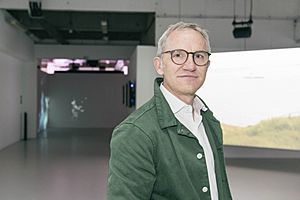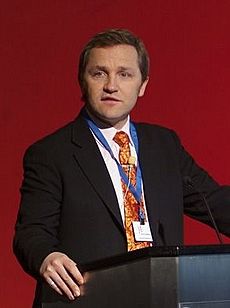James Purnell facts for kids
Quick facts for kids
James Purnell
|
|
|---|---|

Purnell in 2021
|
|
| Secretary of State for Work and Pensions | |
| In office 24 January 2008 – 4 June 2009 |
|
| Prime Minister | Gordon Brown |
| Preceded by | Peter Hain |
| Succeeded by | Yvette Cooper |
| Secretary of State for Culture, Media and Sport | |
| In office 28 June 2007 – 24 January 2008 |
|
| Prime Minister | Gordon Brown |
| Preceded by | Tessa Jowell |
| Succeeded by | Andy Burnham |
| Minister of State for Pensions | |
| In office 5 May 2006 – 28 June 2007 |
|
| Prime Minister | Tony Blair |
| Preceded by | Stephen Timms |
| Succeeded by | Mike O'Brien |
| Member of Parliament for Stalybridge and Hyde |
|
| In office 7 June 2001 – 12 April 2010 |
|
| Preceded by | Tom Pendry |
| Succeeded by | Jonathan Reynolds |
| Islington Borough Councillor for Canonbury East Ward |
|
| In office 5 May 1994 – 12 October 1995 |
|
| Succeeded by | Terence Herbert |
| Personal details | |
| Born | 2 March 1970 London, United Kingdom |
| Political party | None |
| Other political affiliations |
Labour (until 2013) |
| Alma mater | Balliol College, Oxford |
James Mark Dakin Purnell (born 2 March 1970) is a British person who used to be a politician and worked in broadcasting. He was a Cabinet minister in the UK government from 2007 to 2009.
After leaving politics, he worked for the BBC, a big broadcasting company. He was the BBC's Director of Radio and also in charge of their strategy and digital plans. In 2020, he left the BBC to become the head of the University of the Arts London.
Purnell was a Member of Parliament (MP) for Stalybridge and Hyde. He held this job from 2001 until 2010. During his time as an MP, he was a Secretary of State for Culture, Media and Sport from 2007 to 2008. He then became Secretary of State for Work and Pensions from 2008 to 2009. He left the government in June 2009.
Contents
Early Life and Education
James Purnell was born in London. He spent most of his childhood and early education in France. Later, he returned to the UK to study for his A-Levels at the Royal Grammar School, Guildford.
He then went to Balliol College, Oxford University. There, he studied Philosophy, Politics and Economics. While he was a student, he worked for Tony Blair, who later became Prime Minister.
After university, Purnell worked as a researcher. He then joined the BBC as their Head of Corporate Planning.
Early Political Steps
From 1994 to 1995, James Purnell was a local councillor in Islington. He represented the Canonbury East area. In 1997, he went back to work for the government at 10 Downing Street. He stayed there until 2001.
He also served on the boards of several arts organizations. These included the Young Vic theatre and the British Film Institute.
Time as a Member of Parliament
In 2001, James Purnell was chosen to be the Labour Party candidate for Stalybridge and Hyde. He won the election that year. He became a Member of Parliament (MP) for the area.
While he was an MP, he was part of different groups in Parliament. He was on the Work and Pensions Select Committee. He also chaired the All-Party Group on Private Equity and Venture Capital.
Working in Government
In 2003, Purnell started working more closely with the government. He became a Parliamentary Private Secretary to Ruth Kelly. In 2004, he became a Whip, which helps manage party members in Parliament.
After the 2005 election, he was given a role in the Department for Culture, Media and Sport. He worked on laws about alcohol licensing and tax breaks for films. In 2006, he was promoted to Minister of State for Pensions. This meant he was in charge of pension policies.
In 2007, a magazine called Which? named him "Consumer Champion of the Year." They praised his work on a new national pensions saving plan.
In June 2007, Purnell joined the Cabinet. This is a group of senior ministers who lead the government. He became the Secretary of State for Culture, Media and Sport. He was the youngest person in the Cabinet at that time. In January 2008, he became the Work and Pensions Secretary.
Challenges and Resignation
In 2007, there was a story about a hospital using a changed photo of Purnell. The hospital said he agreed to be added to the picture because he was late. Purnell said he did not agree to this.
In 2008, Purnell suggested charging interest on special loans for unemployed people and pensioners. These loans had been interest-free. This idea was not popular and was stopped by the Prime Minister, Gordon Brown.
Purnell was also involved in the 2009 expenses scandal. This was when many MPs faced questions about money they claimed for their homes and other costs. Purnell's claims were looked at, and he explained his actions.
On 4 June 2009, James Purnell announced he was leaving the Cabinet. He also asked Gordon Brown to step down as Prime Minister. This happened just after local and European elections where the Labour Party did not do well.
Purnell wrote a letter to the Prime Minister. In it, he said he believed that Gordon Brown's leadership made it more likely for the Conservative Party to win the next election. He felt it was important for the Labour Party to have a "fighting chance."
Life After Parliament
In February 2010, James Purnell announced he would not stand for re-election as an MP. He said he wanted to do other things outside of politics. He had spent his whole working life in or around Parliament.
After leaving Parliament, he became the head of the Institute for Public Policy Research. He also supported David Miliband in the 2010 Labour leadership election. He was offered a job working for the new Labour leader, Ed Miliband, but he turned it down.
Purnell also worked as an advisor for a company called Boston Consulting Group. He appeared on TV to talk about ideas for welfare reforms. He suggested ideas like a "National Salary Insurance" and free childcare.
Working at the BBC
In 2013, Purnell rejoined the BBC as its Director of Strategy. Because he took this senior role, he had to leave the Labour Party.
In 2016, he was appointed as the BBC's Director of Radio and Education. One of his main goals was to attract younger listeners and viewers to the BBC.
In 2020, he left the BBC. He then became the president and vice-chancellor of the University of the Arts London in 2021.
|
 | Sharif Bey |
 | Hale Woodruff |
 | Richmond Barthé |
 | Purvis Young |


